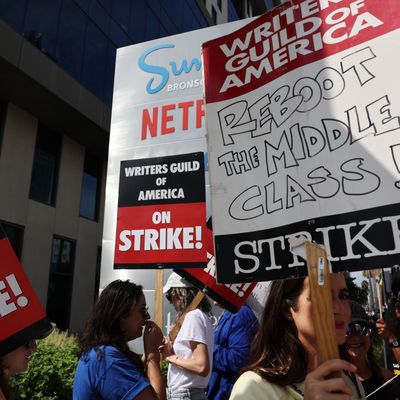
Late on Sunday evening, the Writers Guild of America announced that it had reached a tentative agreement with the Hollywood studios. Members still have to ratify the deal, which would end their strike after almost five months. ( SAG-AFTRA, which represents actors, has not reached such a deal and is still on the picket line.) Though the details are yet to be announced, onlookers can draw one conclusion: Strikes work, and so did the story the union told about its struggle. David Goodman, the former president of WGA-West, told Deadline that one June rally “speaks to the fact that the fight that we’re in is not just our fight” and that writers are “being crushed under the heel of corporate greed. All we want is a good wage and fair pay for work and that connects with all these other people, all these other workers.”
Americans liked that story. One August poll from Data for Progress showed that 67 percent of likely voters supported striking Hollywood workers, which coincides with high rates of public support for unions overall. Americans say they want more worker power, and the labor movement is showing them what it can look like. That story echoes across America as the United Auto Workers strike the Big Three. Their new president, Shawn Fain, rallies members with a compelling economic vision that builds on the union’s history while imagining a better future for all. As the union prepares for a historic visit from President Joe Biden and fends off former president Donald Trump, that vision may be poised to spread.
Fain knows who his enemies are, and he understands the stakes. That’s evident in the union’s strategy and in his own rhetoric. Today’s Stand Up Strike recalls the sit-down strikes of the 1930s, which formed the UAW and helped launch a national strike wave. “We are once again returning to our roots and reclaiming our tradition of holding the line for working people against unchecked corporate power,” he said in one video message. He quotes Malcolm X and at times he even waxes scriptural. “In the kingdom of God, no one hoards all the wealth while everyone else suffers and starves,” he said. “In the kingdom of God, no one forces others to perform endless backbreaking work just to feed their families or put a roof over their heads. That world is not the kingdom of God; that world is hell.”
We are not in the kingdom of God. Nor are we in hell — yet. We have further to fall, and we will, if not for unions. But that is not the message that Trump is bringing to Michigan on Wednesday. Though his campaign originally said he’ll speak to union members, that’s not true: the UAW has not invited him, and Fain has been deeply critical of him. On Tuesday, the Michigan Advance reported that Trump would speak at a non-union automotive parts manufacturer and supplier. “Every fiber of our union is being poured into fighting the billionaire class and an economy that enriches people like Donald Trump at the expense of workers,” Fain said in a statement. “We can’t keep electing billionaires and millionaires that don’t have any understanding what it is like to live paycheck to paycheck and struggle to get by and expecting them to solve the problems of the working class.”
Trump, like most Republicans, has framed the strike as a referendum on electric vehicles. A Trump ad claimed that Biden “turned his back on the autoworkers” by “cutting a deal that uses American tax dollars to help fund China’s electric car business.” The UAW does have concerns about the Biden administration’s EV push, but Trump is trying to get the union off message and Fain has not accommodated him. Instead, he stays admirably on script. The UAW, like the WGA, is fighting a class war, and Trump is on the wrong side. The former president has already discussed another round of individual and corporate tax cuts, the Washington Post reported. Trump would only enrich the wealthy, just as Fain said.
When Biden walks a UAW picket line on Tuesday, it will be at the union’s invitation. Biden’s public display of support might help him shore up key union votes and will polish the image he’s so keen to project. Nevertheless, his appearance in Detroit says more about labor than it does about the almighty horse-race. Labor invited Biden to Detroit and applied enough pressure that the president felt it necessary to go.
This is a remarkable time for the labor movement. The odds still favor unchecked corporate might, to play on Fain’s phrase. Yet labor survives in the shadows of power. Workers have leverage, and they are willing to use it. The WGA says they’ve gotten an “exceptional” deal out of Hollywood. The credible threat of a strike from the Teamsters brought UPS to heel. Over 75,000 health-care workers are prepared to strike for three days next month if they can’t reach a deal with Kaiser Permanente to resolve a staffing crisis. The UAW has expanded its Stand Up Strike at GM and Stellantis facilities after making progress in talks with Ford.
Labor is telling America a story it has long needed to hear. Biden, too, could listen and learn. Trump will spew his usual poison and call himself pro-worker. The labor movement knows the score. No economic vision can be pro-worker as long as it leaves corporate power in place. Instead, the moment demands militancy, alternative scripts and tactics that center worker power. It is possible to challenge the greed, the exploitation, and the abuse that mars so many lives. Solidarity is not a mere slogan but a living practice, visible in picket line after picket line. Labor now offers a vision of economic justice that has been largely absent from the Democratic Party. There is life after neoliberalism, and it’s worth a good fight.
This piece has been updated to reflect the location of Trump’s speech.






























